- Basic Concepts
- Corporate governance system(chart)
- Corporate governance system
- Changes in initiatives to strengthen governance
- A company with an audit and supervisory committee
- Board of Directors
- Audit and Supervisory Committee
- Nominating and Remuneration Committee
- Expertise and experience required of the Company’s directors (skill matrix)
- Management
- Management Council and Shinsa Kaigi
- Audit system
- Structure for outside directors
- Training for outside directors
- The effectiveness evaluation of the Board of Directors
- Remuneration of directors and audit and supervisory committee members
- Strategically held shares
- Internal Control
Basic Concepts
The Inabata Group’s Mission is “People come first, based on the spirit of ‘love (ai )’ and ‘respect (kei ),’ and together we strive towards contributing to the development of society.” With a foundation on this mission, the Company aims to respond to the directive of all stakeholders who support the Company’s activities including shareholders, business partners, and employees, and sustainably improve corporate value. For this, the Company believes it is essential to have a strong corporate governance system for ensuring transparency and fairness in business and speed and resolution in decisions.
Corporate Governance System(As of June 17, 2025)
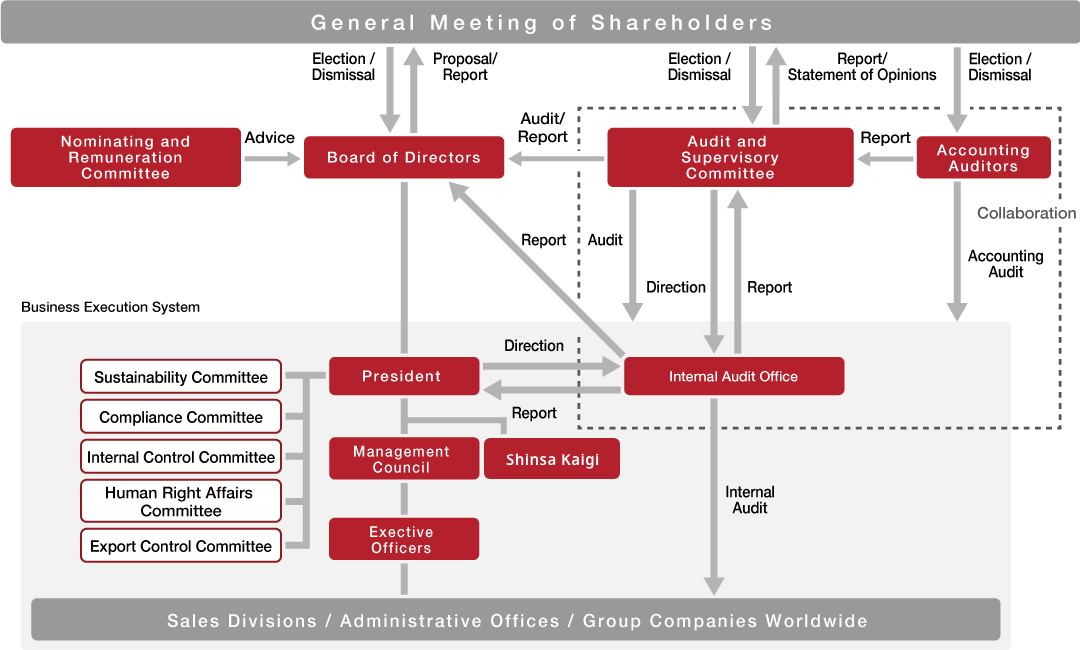
Corporate Governance System (As of June 17, 2025)
| Organizational design | Company with an audit and supervisory committee |
|---|---|
| Directors not on the Audit and Supervisory Committee | 7 (including 3 independent outside directors) |
| Directors on the Audit and Supervisory Committee | 5 (including 4 independent outside directors) |
| Chairperson of the Board of Directors | President |
| Term of office for directors not on the Audit and Supervisory Committee | 1 year |
| Term of office for directors on the Audit and Supervisory Committee | 2 years |
| Executive officer system | Yes |
| Voluntary advisory committees to the Board of Directors | Nominating and Remuneration Committee |
| Accounting auditors | KPMG Azsa LLC |
| Corporate Governance Report | Corporate Governance Report The Company complies with all the principles of the corporate governance code. |
Changes in Initiatives to Strengthen Governance
Period
| June 2003 | Executive officer system introduced |
|---|---|
| June 2006 | Term of appointment of directors reduced from two years to one year |
| June 2013 | Appointment of two outside directors |
| June 2015 | Appointment of three outside directors |
| November 2015 | Nominating and Remuneration Committee established Evaluation of the Board of Directors introduced |
| June 2022 | Transition to a company with an audit and supervisory committee Transition to having outside directors comprise the majority of directors |
Governance framework
Company with an Audit and Supervisory Committee
We have positioned the enhancement and improvement of corporate governance as an important management issue, and have been working to improve the effectiveness of the Board of Directors by shifting the focus of meetings of the Board of Directors from business execution to management strategy and medium- to long-term issues. In June 2022, we transitioned to a company with an audit and supervisory committee in order to further promote these initiatives, further strengthen the Company’s supervisory function, and establish a system to accelerate management decision-making. The majority of the Board of Directors is composed of independent outside directors in order to embody a monitoring-type Board of Directors, thereby enhancing corporate value.
Board of Directors
The Board of Directors makes decisions on important matters set out in laws and regulations, Articles of Incorporation, and Regulations of the Board of Directors. These matters include formulation of business plans and annual budgeting as well as making basic management policies and appointing executive officers. The Board of Directors consists of 12 members, including seven directors who are not Audit and Supervisory Committee members and five directors who are Audit and Supervisory Committee members. Among the 12 members, seven are independent outside directors, comprising the majority. By adopting the organizational structure of a company with an Audit and Supervisory Committee, we have strengthened the monitoring-type Board of Directors’ supervisory function and enabled the delegation of important business execution decisions to executive officers. This structure allows for faster and more agile management decision-making.

Audit and Supervisory Committee
Inabata is a company with an audit and supervisory committee, and the Audit and Supervisory Committee consists of five Audit and Supervisory Committee members, four of whom are outside directors. The committee works in collaboration with the Board of Directors to oversee the executive officers and conducts audits of their business activities. Directors who are members of the Audit and Supervisory Committee are extremely well-versed in finance, accounting, and law, and are also highly independent.
Members of the Internal Audit Office are supporting the duties of the Audit and Supervisory Committee as assistant employees.
Nominating and Remuneration Committee
We have voluntarily established the Nominating and Remuneration Committee. The committee, the majority of which consists of independent outside directors and which is chaired by the lead independent outside director, reviews decisions made by the Board of Directors on issues such as the selection and dismissal of executives, the nomination of candidates for positions of director and executive officer, and the remuneration of directors. The Board of Directors strives to ensure objectivity, fairness, and transparency by fully respecting the deliberation results of the committee.
Members of the Nominating and Remuneration Committee:
Four outside directors (of these, one director who is an Audit and Supervisory Committee member)
One internal director
Chairperson: Lead independent outside director
Number of times held: FY2024 8 times
Expertise and Experience Required of the Company’s Directors (Skill Matrix)
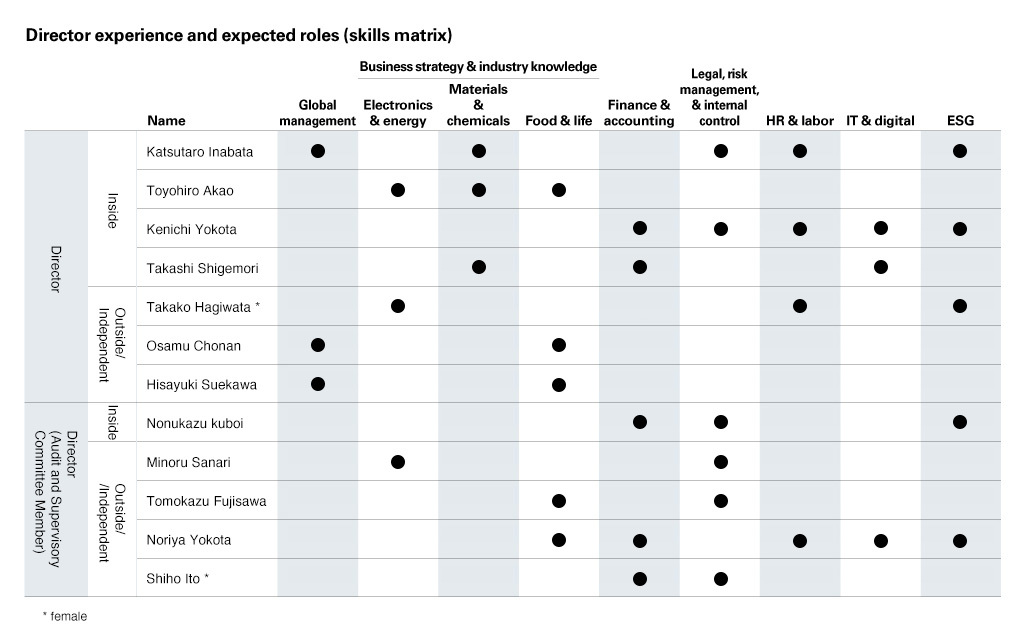
Skills Matrix Approach
Our mission is that “People come first, based on the spirit of ‘love (ai )’ and ‘respect (kei )’, and together we strive towards contributing to the development of society,” and we seek to take the approach of “To continually evolve, serving clients and society, through global operations and meeting their changing needs.” We have also set forth our long-term vision, IK Vision 2030, which is how we envision ourselves around 2030, and have positioned our medium-term management plan, NC2026, as the third stage toward fulfilling that long-term vision. In identifying the skills expected of directors, we have determined what skills are necessary to build a system that can fulfill the decision-making and supervisory functions related to business execution of the Board of Directors of our globally operating company, based on our Mission, Vision, our long-term vision IK Vision 2030, and medium-term management plan, NC2026. From this perspective, we have specifically identified the following skills and developed a skills matrix.
Management Council and Shinsa Kaigi
We set up the Management Council as an institution for business execution. This council deliberates on basic policies and important matters related to management and decides their direction. We have also established the Shinsa Kaigi as an institution to review important matters related to business execution, investment and loan projects, and credit. Its participants (including those who join online) from across the world hold direct discussions with the management.
Number of times convened: FY2024
Management Council 12 times, Shinsa Kaigi 19 times
Audit System
Internal audits
The Company has established the Internal Audit Office under direct supervision of the president and staffed it with certified internal auditors and other qualified professionals. The Internal Audit Office is responsible for ensuring compliance with the internal control reporting system for financial reporting based on the Financial Instruments and Exchange Act, auditing to improve the governance of our domestic and overseas group companies, and auditing compliance with the Act on Securing Quality, Efficacy, and Safety of Products Including Pharmaceuticals and Medical Devices and economic security-related laws and regulations. The Internal Audit Office regularly reports its audit plans and results to the President, the Board of Directors, and the Audit and Supervisory Committee.
Accounting auditors
Accounting audits, quarterly reviews, and internal control audits for Inabata are conducted by KPMG Azsa LLC. The Audit and Supervisory Committee formulates evaluation criteria, including assessments of independence and expertise, for the appointment and non-reappointment of the accounting auditor and makes decisions based on the evaluation results.
Cooperation among the Audit and Supervisory Committee, accounting auditors, and the Internal Audit Office
The Audit and Supervisory Committee, accounting auditors, and the Internal Audit Office collaborate through periodic reporting and discussion of audit results.
In investigating the status of our operations and assets and performing other auditing duties, the Audit and Supervisory Committee works closely with the Internal Audit Office to ensure that audits are conducted in an organized and efficient manner. The committee receives regular reports from the office regarding its audit plans and results. It may also request investigations as necessary or provide specific instructions concerning the execution of the office’s duties.
The Audit and Supervisory Committee and Internal Audit Office hold regular meetings with the accounting auditors to discuss accounting audits and quarterly review reports. While receiving timely and occasional reports from the accounting auditors regarding audits, they also share information with the accounting auditors that could be useful for the audit or that might impact the auditors’ work, based on the information obtained during the execution of their duties. This facilitates the sharing of information and coordination with the accounting auditors.
Structure for Outside Directors
In electing outside directors, Inabata aims to appoint candidates who have abundant experience and knowledge of corporate management, the ability to oversee the decision-making and business execution of the Board of Directors of the Company which conducts business on a global basis, and who provide appropriate advice from an objective perspective. The proportion of outside directors stands at 58% (seven out of 12 directors).
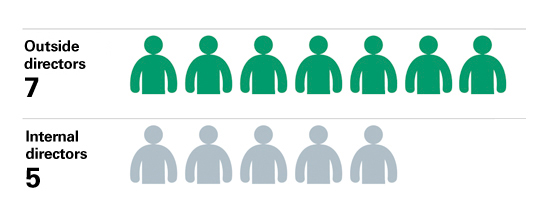
Meetings of outside directors only
Number of times held: FY2024 2 times
Attendance status for FY2024
| Name | Autonomous | Years in office | Meetings of the Board of Directors | Nominating and Remuneration Committee | Reason for appointment |
|---|---|---|---|---|---|
| Directors not on the Audit and Supervisory Committee | |||||
| Osamu Chonan (Leading independent outside director, Chairperson of the Nominating and Remuneration Committee) |
● | 2 years | 100% 16/16 times |
100% 8/8 times |
Osamu Chonan has served as representative director, president, and chief executive corporate officer of Kewpie Corp., he is currently an outside director of Lotte Co., Ltd. He held positions of responsibility for many years in the sales division of a food manufacturer with a global presence centered in China and Southeast Asia, in addition to which he has also served in management, and accordingly has extensive knowledge and experience. Based on this, Inabata considered him suitably qualified and appointed him as outside director. It is expected that he will use his abundant experience and extensive knowledge as a manager to provide oversight and advice in relation to the Company’s execution of business operations from an objective perspective. |
| Hisayuki Suekawa (Nominating and Remuneration Committee member) |
● | 1 year | 92% 12/13 times |
100% 7/7 times |
After serving as director, corporate executive officer, and general manager of the business planning department of Shiseido Co., Ltd., and subsequently as representative director, president and CEO of the said company, Hisayuki Suekawa is currently an outside director of Morishita Jintan Co., Ltd., and member board trustees of Showa Women’s University. We appointed him as an outside director in light of his career background as the management of a global cosmetics manufacturer that operates in about 120 countries and regions, and his extensive knowledge and experience. We expect him to draw on his vast experience and knowledge he has accumulated as a manager to provide oversight and advice to the Company’s execution of duties from an objective perspective. |
| Mari Ikegaki (Nominating and Remuneration Committee member) |
● | Newly appointed | - | - | Ms. Mari Ikegaki has held key leadership roles including director and head of human resources department at Morgan Stanley Japan Group Co., Ltd., representative director of Morgan Stanley Business Group Co., Ltd., and managing director at Morgan Stanley. She currently serves as the trustee of Ferris Jogakuin. Over the years, she led the human resources function at a global financial institution offering a wide range of services including investment banking, securities, and asset management, while also participating in corporate management as a member of the executive committee. In light of her broad expertise and experience, the Company has appointed her as an outside director. We look forward to her guidance on human resources strategy and the advancement of diversity initiatives. |
| Directors on the Audit and Supervisory Committee | |||||
| Minoru Sanari | ● | 3 years | 100% 16/16 times |
- | Minoru Sanari served as General Counsel, Legal Section, General Administration Department for Tokyo Gas Co., Ltd. before serving as an Executive Officer (in charge of governance), and Senior Advisor for said company. He currently serves as Special Counsel of Hayakawa Law Offices. As he has expert knowledge and an abundance of experience from his involvement with corporate legal matters and corporate governance over the course of many years in his capacity as an attorney at the largest city gas company, Inabata appointed him in expectation of accurate auditing and supervision of overall management. |
| Tomokazu Fujisawa | ● | 3 years | 100% 16/16 times |
- | Tomokazu Fujisawa has served as a full time audit and supervisory board member and a director who is an audit & supervisory committee of Astellas Pharma Inc. He has worked as the Director of Planning for a business division in a global pharmaceutical company that develops pharmaceutical businesses around the world, also has experience in overseas subsidiaries and auditing operations, and has served as a director on an audit and supervisory committee, which is why Inabata appointed him in expectation of accurate auditing and supervision of overall management. |
| Noriya Yokota (Chairperson of the Audit and Supervisory Committee, Nominating and Remuneration Committee member) |
● | 2 years | 100% 16/16 times |
100% 7/7 times |
Noriya Yokota has served as director and senior executive officer of Kirin Holdings Co., Ltd., director of Kirin Business System Co., Ltd., and director of Kirin Brewery Co., Ltd and is currently a Senior Advisor for Japan Activation Capital, Inc. He has served as a factory manager and head of the production department at a manufacturer that produces and sells alcoholic beverages, beverages, and pharmaceuticals around the world, and after serving as manager of an overseas subsidiary of the same company, he has been in charge of human resources, finance, IT, and management strategy as an executive officer. He accordingly has a great degree of insight and abundant experience. Based on this, Inabata has determined that he can be expected to provide accurate audit and supervision for the overall management of the Company and appointed him as outside director who is an Audit and Supervisory Committee member. |
| Shiho Ito | ● | 1 year | 100% 13/13 times |
- | Shiho Ito was a partner at Shin Nihon & Co. (now Ernst & Young ShinNihon LLC), and she is currently an outside director of Japan Display Inc., a certified public accountant at Shiho Ito certified public accountant’s office, and supervisory director of Nomura Real Estate Private REIT, Inc. In addition to being a certified public accountant and having been a partner at a major Japanese audit firm, she is currently serving as an outside director of a major global LCD panel manufacturer, demonstrating extensive business knowledge in addition to expertise as a professional accountant. Based on her such qualifications, we expect her to provide accurate audit and supervision for the overall management of the Company and appointed her as an outside director who is an Audit and Supervisory Committee member. |
Training for Outside Directors
In order to deepen outside directors’ understanding of the Group’s business activities, we provide opportunities for them to meet with the heads of each division, as well as opportunities to visit overseas(including online meetings). Even after directors have assumed office, we offer and facilitate training opportunities to help them acquire the necessary knowledge and promote an understanding of their roles and responsibilities. The status of directors’ training is reported to the Board of Directors once a year.
The Effectiveness Evaluation of the Board of Directors
With the aim of increasing corporate value through enhancing the effectiveness and transparency of the board of directors, Inabata & Co., Ltd. has been conducting the evaluation of the board of directors since FY2015.
- Each cycle lasts for three years in which self-evaluation is carried out for the first two years and third-party evaluation is carried out in the third year.
- The overview of the evaluation and issues to be considered are published on the Company’s website.
- Self-evaluation was carried out in FY2024.
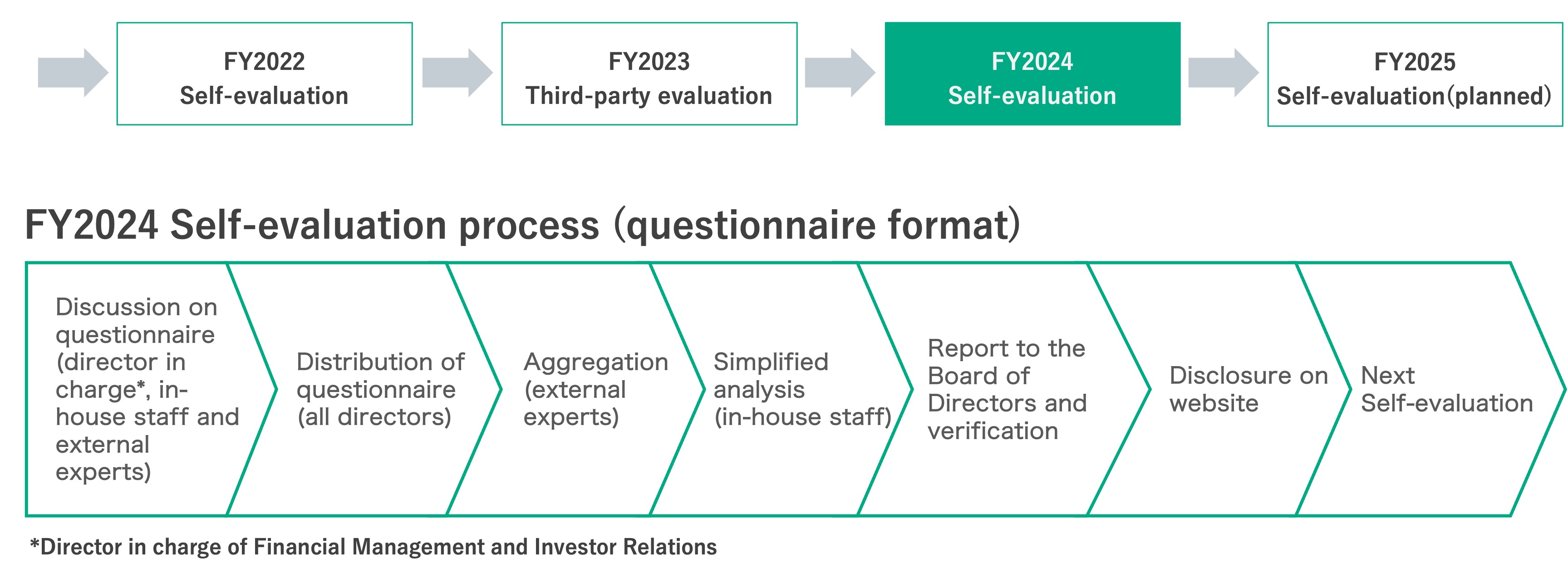
Evaluation Results for FY2024
| Target of evaluation | All 12 current directors as of March 31, 2025 7 directors who are not audit and supervisory committee members, 5 directors who are audit and supervisory committee members |
|---|---|
| Evaluation methodology |
|
| Results of the analysis and evaluation |
The results of the analysis and evaluation indicated that the operations of the Board of Directors of the Company were appropriate and highly rated overall for its open and lively discussions, led by a chairperson who encourages open exchange of opinions. The results also indicated that the Company was providing sufficient support to outside directors in general, who in turn were making significant contributions to Board discussions; the Nominating and Renumeration Committee as well as the Audit and Supervisory Committee were being operated properly; the status of dialogue with investors and shareholders was being shared with the Board of Directors adequately; and appropriate measures were being taken to address the issues identified in the previous Board of Directors evaluation. Based on these evaluation and analysis results, the Company confirmed that the Board of Directors was executing its functions appropriately in general while maintaining effectiveness. The results also confirmed that the following improvements and developments had been made in resolving the issues identified in the previous third-party evaluation on effectiveness.
Meanwhile, the results confirmed that the following issues should be further addressed in the future.
The Company identified as key risks it faces, especially those that are deemed particularly important, potential risks of overseas activities, risk related to business investment, and credit risks of clients. |
| Future measures | The Company will strive to further enhance the effectiveness of the Board of Directors by taking measures to address the issues identified from the result of the above analysis and evaluation. In fiscal 2025, the Company plans to conduct a self-evaluation of the Board of Directors. |
Major items from the Board of Directors evaluation questionnaire
- 1. Operational status of the Board of Directors
- 2. Function and role of the Board of Directors
- 3. Composition of the Board of Directors
- 4. Composition and role of the Nominating and Remuneration Committee
- 5. Operational status of the Nominating and Remuneration Committee
- 6. Composition and role of the Audit and Supervisory Committee
- 7. Operational status of the Audit and Supervisory Committee
- 8. Support system for outside directors
- 9. Relationship with investors and shareholders
- 10. The Company’s governance structure and the effectiveness of the Board of Directors as a whole
- 11. Self-assessment of one’s contributions and participation in Board discussions
Remuneration of Directors and Audit and Supervisory Committee Members
A summary of information on remuneration and other benefits is as follows.
1. Remuneration for directors who are not Audit and Supervisory Committee members
| (1) Fixed remuneration*1 | Minimum guaranteed amount by position |
|---|---|
| (2) Performance-linked remuneration | Calculated by multiplying the fixed remuneration for each position in (1) by a coefficient for: ・Profit before income taxes and non-controlling interests (excluding gain on sales of investment securities)*2 ・Returns on capital (ROIC and ROE)*3 ・Stock price*3 ・ESG scores from multiple external evaluation organizations (FTSE Russell and MSCI)*4 Performance-based compensation is calculated by multiplying each of the above coefficients. |
| (3) Board Benefit Trust (BBT)*5 | A system under which executive directors receive the points granted to them during their term in the form of shares and cash upon their retirement. The calculation method of points granted to directors is as follows. (Method of calculating points awarded to directors) Points granted for the current year = ⒶService points + ⒷPerformance points Ⓐ50% of the base points determined for each position (fixed point) ⒷService points × performance coefficient Performance coefficient: Determined based on the achievement rates of the consolidated operating profit target*6 and the Group engagement survey*7 |
- *1:Remuneration for directors who are not executive directors is fixed remuneration only.
- *2:Executive directors are responsible for all business activities of the entire Group, including the operating and financial activities of Group companies, and we believe that the results of these activities are reflected in consolidated profit before income taxes and non-controlling interests, which is used as one indicator.
- *3:We have adopted ROIC as an indicator because one of the key strategies in our medium-term business plan, NC2026, is “accelerate growth through proactive investment,” furthermore we believe that capital efficiency and investment yield should also be considered in light of requests from the capital market and trends among listed companies. In addition, as part of our measures to realize management conscious of cost of capital and share prices, we use ROE and share price (specifically, the difference between the year-on-year growth rate of TOPIX and the year-on-year growth rate of our share price) as indicators.
- *4:Since we recognize that addressing sustainability is an important management issue for our company, we use ESG scores from several external evaluation organizations as an indicator.
- *5:We have introduced the Board Benefit Trust (BBT) as a performance-linked stock compensation plan in order to clarify the linkage between the compensation of executive directors and our business performance and stock value. Having directors share not just the benefits of higher stock prices, but also the risk of lower stock prices with shareholders, will increase their awareness, so that they can contribute to improving business performance and increasing corporate value over the medium to long term.
- *6:Actual performance compared to the rate externally announced in the medium-term business plan
- *7:The achievement rate of the employee engagement survey KPI set under the Sustainability Medium-Term Plan
FY03/2025
The performance indicators approved in June 2025
| Consolidated financial results | Return on capital | Share price | ESG scores | ||||
|---|---|---|---|---|---|---|---|
| Profit before income taxes(A) | 291 billion yen | ROIC | 8.3% | YoY growth in share price | 5.6% | FTSE Russel | 3.6 |
| Investment securities(B) | 36 billion yen | ROE | 9.7% | - | MSCI | 5.4 | |
| (A)-(B) | 255 billion yen | - | - | - |
The performance factors approved in June 2025
| NC2026 FY03/2025 target |
FY03/2025 actual | Target achievement rate | Performance coefficient | |
|---|---|---|---|---|
| Consolidated operating profit | 22,500 million yen | 25,824 million yen | 115.0% | 0.98 |
| Employee engagement surveys | 80% | 70% | 88% |
Of the remuneration for directors who are not members of the Audit and Supervisory Committee, (1) fixed remuneration and (2) performance-linked remuneration are determined by the Board of Directors within the scope of the total amount of remuneration approved by the Ordinary General Meeting of Shareholders. The maximum amount of remuneration for directors who are not members of the Audit and Supervisory Committee as per the resolution of the Ordinary General Meeting of Shareholders is 430 million yen per year (of which 50 million yen is for outside directors). In addition, as a performance-linked stock compensation plan for executive directors, the Company has resolved (3)compensation limits for the Board Benefit Trust (BBT).
The individual remuneration of directors who are not Audit and Supervisory Committee members is designed to be calculated automatically using a formula and coefficient defined in regulations resolved by the Board of Directors, without taking qualitative factors into consideration, and the Human Resources Office will calculate this in accordance with regulations. The results of the calculations are reviewed by the Nominating and Remuneration Committee, which is chaired by the lead independent outside director and at which independent outside directors have a majority. The Board of Directors determines the compensation of directors who are not Audit and Supervisory Committee members with full respect for the results of the deliberations of the Nominating and Remuneration Committee.
These sorts of procedures ensure objectivity, fairness, and transparency in the determination of individual compensation for directors who are not Audit and Supervisory Committee members, and the determination of individual compensation is never delegated to specific directors or other parties.
2.Remuneration for directors who are Audit and Supervisory Committee members
| Fixed remuneration | Fixed remuneration only |
|---|
Remuneration for directors who are Audit and Supervisory Committee members is decided via discussions by directors who are Audit and Supervisory Committee members, within the scope of total remuneration approved by the Ordinary General Meeting of Shareholders. The maximum remuneration amount for directors who are Audit and Supervisory Committee members, as per the resolution of the Ordinary General Meeting of Shareholders, is 80 million yen per year.
Actual remuneration of directors in FY2024*8
| Classification | Total amount of remuneration and other benefits (millions of yen) | Total amount of remuneration and other benefits by type (millions of yen) | No. of eligible persons | ||
|---|---|---|---|---|---|
| Fixed remuneration | Performance-linked remuneration | Board Benefit Trust (BBT) | |||
| Directors (excluding Audit and Supervisory Committee members and outside directors)*9*11*12*13 | 269 | 114 | 111 | 43 | 5 |
| Directors (Audit and Supervisory Committee members; excluding outside directors)*10 | 22 | 22 | - | - | 1 |
| Outside directors | 72 | 72 | - | - | 9 |
- *8:The above includes one director who is not an outside and Audit and Supervisory Committee member, and two outside directors who are Audit and Supervisory Committee members, all of whom retired at the conclusion of the 163rd Ordinary General Meeting of Shareholders held on June 21, 2024.
- *9:At the 161st Ordinary General Meeting of Shareholders held on June 22, 2022, the annual amount of remuneration for directors (excluding Audit and Supervisory Committee members) was approved at up to 430 million yen (of which 50 million yen is for outside directors). As of the conclusion of the General Meeting of Shareholders, the Company had seven directors (including two outside directors; excluding Audit and Supervisory Committee members).
In addition, at the same General Meeting of Shareholders, remuneration limits for the Board Benefit Trust (BBT), the introduction of which was approved at the 157th Ordinary General Meeting of Shareholders held on June 22, 2018, were reapproved. As of the conclusion of the General Meeting of Shareholders, four directors were eligible for the remuneration program. - *10:At the 161st Ordinary General Meeting of Shareholders held on June 22, 2022, the annual amount of remuneration for directors (Audit and Supervisory Committee members) was approved at up to 80 million yen. As of the conclusion of the General Meeting of Shareholders, four directors (all of whom are Audit and Supervisory Committee members and outside directors) were eligible for the remuneration program.
- *11:BBT is the amount of provision for the reserve for directors’ stock benefits included in the fiscal year under review.
- *12:The Company has not established a guideline on deciding the payment ratio between performance-linked remuneration and other types of remuneration for directors (excluding directors who are Audit and Supervisory Committee members and outside directors) because these forms of remuneration are determined automatically based on their respective performance indicators and formulas, and therefore have no possibility of being adjusted arbitrarily.
- *13:Remuneration for directors for the fiscal year under review was deliberated on at a meeting of the Nominating and Remuneration Committee held on May 22, 2024, and approved at a meeting of the Board of Directors held on June 21, 2024. The Board of Directors has checked that the determination method for, and the details of, the individual remuneration for directors in the fiscal year under review are consistent with the determination policy approved by the Board of Directors, and has deemed that they are in accordance with such determination policy.

Strategically held Shares
Basic views
Close business and cooperative relations with various companies are valuable assets to Inabata, and the Company believes the establishment, maintenance and development of these relations improve the Company’s corporate value in the medium and long term and lead to the benefit of shareholders and investors. Also, as Inabata believes that strategically holding shares of such companies continues to be an effective way to establish, maintain, and develop good cooperative relations, the Company owns strategically held shares.
Policy related to holding and reducing strategically held shares
Inabata forms a judgment concerning the pros and cons of strategically held shares based on whether holding them contributes to the establishment of cooperative relations, enhances the Company’s corporate value in the medium and long term, and leads to the benefit of shareholders and investors. To be specific, the Board of Directors will make annual comprehensive reviews of the appropriateness of holding each individual stock, taking into account the financial condition of the investee company, the liquidity of the stock, trends in the volume of transactions and profits related to business with the Company or its Group companies and their medium- to long-term prospects, economic rationales such as whether the risk and return are commensurate with the cost of capital, and other qualitative information. The Company follows a policy of reducing the shares that the holding of which is not considered significant, while considering timing and the effect on the market and the business.
The Company has been promoting its three-year mid-term management plan “New Challenge 2026” (“NC2026”), which will end in the fiscal year ending March 31, 2027. Under this plan, one of the Company’s financial strategies is to “generate investment funds and improve asset efficiency by reducing strategic shareholdings.” The Company is making steady progress implementing this Policy on Reduction of Strategic Shareholdings. The Company will continue to reduce its strategic shareholdings toward the reduction target for March 31, 2027, marking the final year of “NC2026.”
Policy on reducing strategic shareholdings
We will reduce strategically held shares over the medium to long term, aiming to cut the balance by approximately 80% by March 31, 2027, relative to the balance as of March 31, 2021.
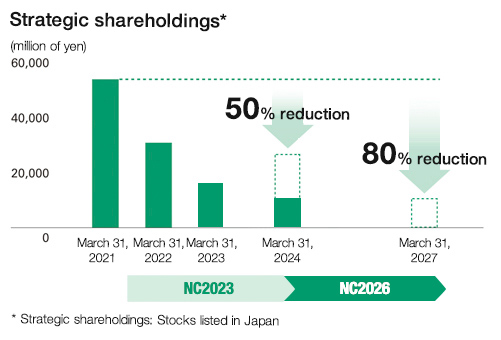
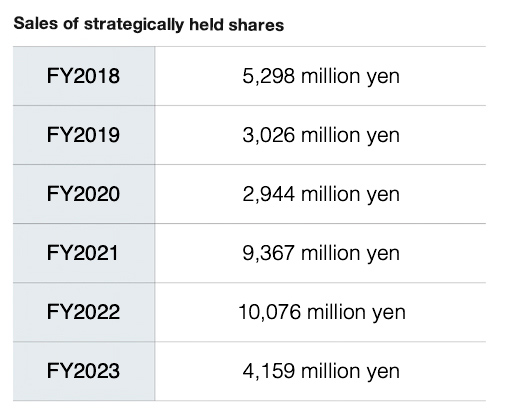
Criteria for exercise of voting rights
In principle, Inabata exercises voting rights for all agendas in order to exercise its rights as a shareholder. The Company reviews the merits and demerits of each agenda and exercises voting rights based on the judgment criteria of whether sustainable growth of the held company and improvement of its corporate value in the medium and long term can be expected.
Internal Control
Policy and system
Inabata maintains and operates an internal control system to support compliance and ensure proper business operations. The system was created in accordance with our basic policy on the internal control system and the progress of system development, which is based on the Companies Act and the Ordinance for Enforcement of the Companies Act. We also maintain basic regulations for internal control related to financial reporting, based on the Financial Instruments and Exchange Act, stipulating our basic policy and system, roles and responsibilities, and guidelines for evaluation of our financial reporting. Results of the evaluations of the effectiveness of our internal control system are reported in the Internal Control System Report, which receives an internal control audit by an independent auditor and is submitted with our annual securities report.
The internal control system includes the Internal Control Committee and Compliance Committee, which are respectively chaired by the individuals in charge of the internal control and compliance, as well as offices including the Risk Management Office and Business Process Management Office. The committees and offices work together to ensure effective operations among subsidiaries and throughout the Inabata Group.
The Internal Audit Office, which is independent of the executive bodies of the business divisions, supplements business audits conducted by the audit and supervisory committee and accounting audits by the independent auditor by carrying out internal audits (business audits) to ensure sound and appropriate business operations of the Group. Inabata is enhancing Group governance by conducting internal audits that include its subsidiaries.
